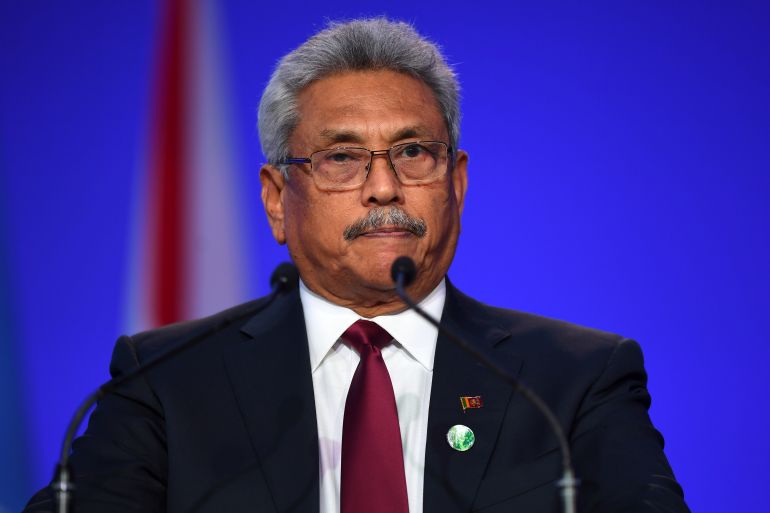Sri Lanka’s Gotabaya Rajapaksa returns weeks after fleeing island
Rajapaksa resigned as president in July after protesters angered by a debilitating economic crisis stormed his office and residence.

Sri Lanka’s deposed President Gotabaya Rajapaksa has returned home weeks after fleeing the crisis-hit country, officials said.
The 73-year-old former leader landed in the capital, Colombo, on a Singapore Airlines flight from Thailand in the early hours of Saturday, local media reports said.
Keep reading
list of 4 itemsSri Lanka’s Rajapaksa hands in resignation; letter accepted
Former Sri Lanka president who fled homeland arrives in Thailand
IMF to meet Sri Lanka president to finalise bailout package
Rajapaksa resigned in July after tens of thousands of protesters angered by a debilitating economic crisis stormed his office and residence.
He fled to the Maldives on July 9, went to Singapore from there and spent the past few weeks in Thailand on a diplomatic visa.
Al Jazeera’s Minelle Fernandez, reporting from Colombo, confirmed Rajapaksa’s return.
“We do have confirmation that former President Gotabaya Rajapaksa has returned to the country,” she said.
Fernandez later said that the return had “happened very quickly”.
“No one expected him to return when he literally fled the country on a military jet just a few week ago,” Fernandez said.
“What his options are in the coming days and months will remain to be seen. He’s obviously relinquished office, but he’s very much part of the Rajapaksa clan and the family and they haven’t given up, as far as we’re hearing, in terms of politics.”
Economic crisis
Rajapaksa was elected president in 2019 by an overwhelming majority on a promise to uplift the country’s economy and strengthen national security after ISIL (ISIS)-inspired bomb attacks on churches and hotels killed 270 people on Easter Sunday that year.
However, policy blunders including drastic tax cuts which reduced national income and pushed down credit ratings, a ban on agrochemicals ostensibly to promote organic farming, and the release of scarce foreign currency to artificially control exchange rates led to the worst economic crisis in the country’s history.
Sri Lanka has suspended repayment of its foreign debts, which total more than $51bn, of which $28bn must be repaid by 2027.
The International Monetary Fund announced on Thursday a preliminary agreement to extend $2.9bn to Sri Lanka over four years, provided there are assurances from the country’s creditors on loan restructuring.
Months of street protests have dismantled the once-powerful Rajapaksa political family.
Before Rajapaksa resigned, his older brother Mahinda Rajapaksa stepped down as prime minister and three more close family members quit their cabinet positions.
President Ranil Wickremesinghe, who succeeded Rajapaksa, has cracked down on protests, helping the Rajapaksa family and its supporters who were in hiding to return to public politics.
Nuzly Hameem, one of the leaders of the protest movement, said the former president’s return should not be an issue “as long as he is held accountable”.
“He is a Sri Lankan citizen so no one can prevent him from coming back. But as someone who wants justice for the corrupt system, I would like to see action taken – there should be justice, they should file cases against him and hold him accountable for what he did to the country.”
“We didn’t expect him to flee. We wanted him to resign. As long as he doesn’t involve himself in active politics, it won’t be a problem,” Hameem said.